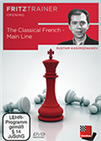Anybody's game
It is hard to think of a more uncertain scenario in a tournament — it is not impossible for one of the leaders to win his last two games and take first place outright and, at the same time, it is feasible to imagine four or more players ending up shared first. Therefore nerves will play a big role in the final rounds, when a single mistake might take any player out of contention. It is anybody's game, as it would be naïve to talk about favourites at this point.
This is a good time to take a look at the regulations regarding tiebreaks in case of a tie for first. The policy in the Isle of Man is to have a single deciding match between two players. Before going into the format of this match, let us see what would happen if three or more players are tied — the following criteria will be followed:
- The results between the players involved in the tie
- Sum of progressive score
- Sum of opponent's scores (Buchholz)
- Sonneborn-Berger
- Number of won games
In the deciding match, two 5'+2" blitz games will be played. In case of a tie, an Armageddon game will take place, with 5 minutes for White and 4 for Black, plus an increment of 2 seconds per move from move 61 — Black has draw odds.
Going back to the action of round seven, despite the fact that the first six boards finished in draws, most of them were hard-fought. On first board, Maxime Vachier-Lagrave needed six minutes to play his seventeenth move in a complex middlegame that resulted from a Ruy Lopez:
The time spent by Maxime to play 17.c4 was mentioned above because his rival, Arkadij Naiditsch, spent no less than 42 minutes to respond! And we cannot blame him, especially if we look at the ensuing variation seen in the game (and the many possible sidelines that needed to be calculated). The co-leaders continued with 17.Nxe5 18.cxd5 Nxf2 19.Kxf2 Ng4+ 20.Rxe1+:
 Such a dynamic and popular opening as the Najdorf is developing the whole time. On this download, Daniel King updates lines that were included on his DVD but also responds to viewers’ requests, considering lines that he omitted from his original repertoir
Such a dynamic and popular opening as the Najdorf is developing the whole time. On this download, Daniel King updates lines that were included on his DVD but also responds to viewers’ requests, considering lines that he omitted from his original repertoir
MVL took with the queen and accepted a repetition a few moves later, as his king was unprotected and his queenside undeveloped.

Will Vachier-Lagrave or Naiditsch manage to pull ahead in the end? | Photo: John Saunders
The all-Russian game between Vladislav Artemiev and Vladimir Kramnik was a strategical struggle in which the older Vlad obtained the upper hand with the black pieces. Kramnik handled the position in remarkable fashion but did not take his chance to force matters in his favour when he could have done so:
 On this 60 Minutes renowned and successful coach Adrian Mikhalchishin presents critical positions and shows how to handle them.
On this 60 Minutes renowned and successful coach Adrian Mikhalchishin presents critical positions and shows how to handle them.
The former World Champion invited a queen exchange with 30...Qg6 when he could have gone for the energetic 30...f5. White would have been forced to exchange queens after 31.Qd1 and Black's a-pawn would have started moving forward, making it hard for White to keep it at bay while maintaining material balance. In the game, the contenders continued fighting in a nuanced endgame until move 64, when the draw was signed. It was a case of what could have been for the veteran.

Kramnik looked disappointed after letting go of his advantage | Photo: John Saunders
The big winner of the day was Mickey Adams, sometimes nicknamed Spiderman, who incidentally defeated the player that wore a Superman cap throughout the event — Abhijeet Gupta. An Exchange French-type position benefited the Englishman's ability to find subtle positional resources in seemingly quiet setups. According to the computer evaluation, Gupta erred on move 24:
 After 1.e4 e6 2.d4 d5 3. Nc3 Nf6 4. e5 Nfd7 5. f4 c5 6. Nf3 Nc6 7. Be3, the author takes a detailed look at a daring line with 7... cxd4 8. Nd4 Qb6, as well as the quieter plans with 7...cxd4 8. Nd4 Bc5, and the main line with 7... a6 and b5.
After 1.e4 e6 2.d4 d5 3. Nc3 Nf6 4. e5 Nfd7 5. f4 c5 6. Nf3 Nc6 7. Be3, the author takes a detailed look at a daring line with 7... cxd4 8. Nd4 Qb6, as well as the quieter plans with 7...cxd4 8. Nd4 Bc5, and the main line with 7... a6 and b5.
The Indian went for 24...Ng6, when he should have kept the option of taking the knight to e6 in the future, without losing a tempo due to a pawn attacking the piece from h5 (as was later seen in the game). Massive simplifications followed and Black was left with an inferior structure. It took Adams some thirty more moves to grind down the victory, a common sort of win for England's highest-rated player.

Spiderman won the super-hero battle | Photo: John Saunders
On a lower board, Alexei Shirov won the kind of game that brought him to fame in the past, against Le Quang Liem. It is a struggle worth replaying in full, but here is a small example of the sharp play that was seen right from the opening:
 Ever since the Kasparov-Kramnik WCh match (London 2000) players with the white pieces have been breaking their teeth biting on the Berlin Wall in the Ruy Lopez. The situation from White’s point of view has become precarious – ducking it is equivalent to capitulation, because in all alternative variations to the Berlin endgame White gives up from the start on the struggle for an opening advantage. White has to find ways to crack open Black’s defence. There is hardly any other grandmaster of his class who is as well known for his uncompromising and creative play as the Latvian Alexei Shirov.
Ever since the Kasparov-Kramnik WCh match (London 2000) players with the white pieces have been breaking their teeth biting on the Berlin Wall in the Ruy Lopez. The situation from White’s point of view has become precarious – ducking it is equivalent to capitulation, because in all alternative variations to the Berlin endgame White gives up from the start on the struggle for an opening advantage. White has to find ways to crack open Black’s defence. There is hardly any other grandmaster of his class who is as well known for his uncompromising and creative play as the Latvian Alexei Shirov.
White (Shirov) is a piece up, but his king's position invited Le Quang Liem to continue looking for a perpetual check until move 56. In the position shown above, Alexei played 44.Nb7 — Black cannot take due to mate on c8. Shirov now belongs to the huge group of chasers on 5/7.

Alexei Shirov showed his class | Photo: John Saunders
With the end of the tournament getting closer, the favourites have climbed up the standings — amongst the co-leaders the only slightly surprising name is that of Jeffery Xiong's. Aronian, Giri, Kramnik, Anand, Grischuk and Karjakin are in the chasing pack, while the only top-10 clearly underperforming is Wesley So.

Jeffery Xiong and Hikaru Nakamura | Photo: John Saunders
It is impossible to highlight one or two particular games from round eight's top boards — they are all alluring!
Round 8 pairings (top 20 boards)
Games from Round 7
Links
























